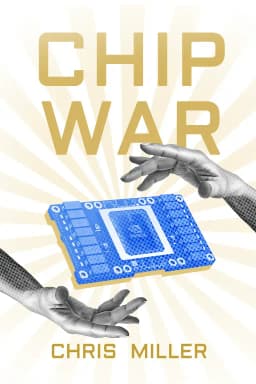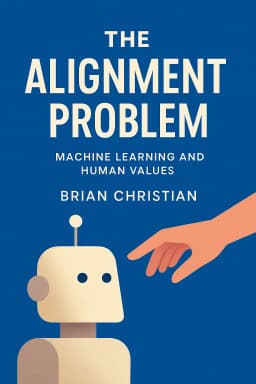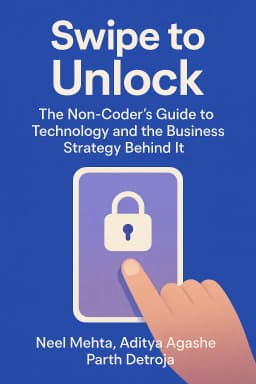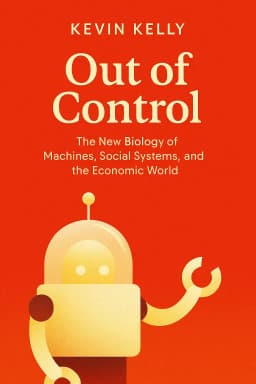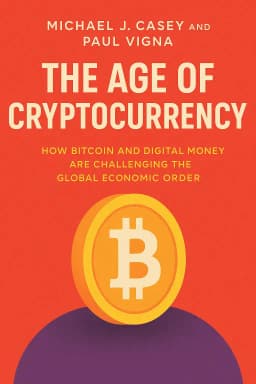
Crypto's Escape Hatch
How Bitcoin and Digital Money Are Challenging the Global Economic Order
Golden Hook & Introduction
SECTION
Joe: I'm going to give you a number, Lewis: 2.5 billion. Lewis: Okay, that's a big number. What am I buying? Joe: Nothing. That's the point. 2.5 billion is the number of people on Earth who live without a bank account. For them, money isn't just an inconvenience; it's a locked door to the global economy. Today, we're talking about a digital key that could potentially unlock it. Lewis: Whoa. 2.5 billion. That’s almost a third of the planet. When you put it like that, it’s not some abstract economic statistic. That’s billions of people cut off from opportunity, from savings, from a modern life. Joe: Exactly. And it’s the central question in the book we're diving into today, The Age of Cryptocurrency: How Bitcoin and Digital Money Are Challenging the Global Economic Order by Paul Vigna and Michael J. Casey. Lewis: I like the sound of that title. It’s bold. Joe: It is, and what's fascinating is who wrote it. These aren't just tech evangelists or crypto-bros. When they wrote this back in 2015, they were both veteran Wall Street Journal reporters. They approached this whole phenomenon like investigative journalists trying to understand a global shift, not just a piece of tech. Lewis: That’s a crucial detail. So they’re coming at it with a healthy dose of skepticism, not just starry-eyed optimism. I bet that’s why the book got such high praise from places like The Economist and even the historian Niall Ferguson. They’re treating it as a serious economic and social force. Joe: Precisely. They’re not just looking at code; they’re looking at the real-world impact. That 2.5 billion number suddenly feels very, very personal. Lewis: It does. It makes you realize that for most of us, the financial system is like the air we breathe—we don't even notice it. But for billions of people, it's a wall. Joe: And the book opens with one of the most powerful examples of someone trying to climb that wall that I've ever read. It’s the story of a young woman named Parisa Ahmadi.
The Human Face of Disruption: Money as Freedom
SECTION
Lewis: Okay, I'm hooked. Tell me about Parisa. Joe: Parisa is a top student at a high school in Herat, Afghanistan, back in 2013. She’s brilliant, ambitious, and wants to learn about the internet and social media. A U.S. arts group called Film Annex is offering classes to Afghan girls, teaching them digital literacy and paying them to write blog posts. Lewis: That sounds amazing. A chance to connect with the world and earn an income. What’s the catch? Joe: The catch is the system she lives in. In her society, a woman's life is incredibly restricted. To even attend the classes, she has to fight for permission from her family. But she does it. She starts blogging, she’s good at it, and she starts earning money. But then comes the next wall: how does she get paid? Lewis: Right. No bank account, I’m guessing. Joe: Exactly. She can't open one without a male relative's permission. And even if she could, the international wire transfer fees would eat up most of her earnings. Her hard-earned money is trapped, controlled by the very system she's trying to gain independence from. Lewis: Oh, man. That’s heartbreaking. She does all the work, but she can’t actually control the reward. Joe: This is where the story turns. The founder of Film Annex, Francesco Rulli, sees this problem happening with all his bloggers in developing countries. The traditional banking system is failing them. So, in early 2014, he makes a radical decision: he's going to pay all of them in Bitcoin. Lewis: Wow. So, how does that even work for Parisa? It’s not like there’s a Bitcoin ATM in Herat. Joe: It’s simpler than you’d think. All she needs is a smartphone and a Bitcoin wallet app. The money is sent directly to her, peer-to-peer. No bank, no government, no male relative as an intermediary. It’s just hers. The book quotes her, and it’s a powerful line. She says Bitcoin is, "teaching us how to be independent and how to decide by our own, and best of all, how to stand on our own feet." Lewis: That gives me chills. It’s not about the price of Bitcoin or speculation. For her, it’s about fundamental freedom. The freedom to own the fruits of her own labor. Did she actually get to use it for anything? Joe: She did. The company set up an e-commerce site where the bloggers could spend their Bitcoin. And Parisa, with the first money she ever truly controlled herself, bought a new laptop. It was a tool to further her education, to connect with the world, to build her future as the doctor she dreamed of becoming. Lewis: That’s incredible. A laptop bought with Bitcoin in Afghanistan. It completely reframes the whole conversation. We hear about crypto being used for crime on the Silk Road or for wild speculation, but this is the polar opposite. This is empowerment. Joe: It’s the book's opening argument. Before they even get into the nitty-gritty of blockchain, they want you to understand the human stake. For someone like Parisa, Bitcoin wasn't an investment; it was an escape hatch. Lewis: That's a powerful story, but I have to ask the skeptical question. Is this scalable? Or is this just a one-off, feel-good case that makes for a great book intro? Can this technology really solve the problem for those 2.5 billion people? Joe: That is the perfect question. And to understand if it's scalable, we have to zoom out and ask a bigger question the book tackles: why do we even need an alternative? What's so broken about the system we already have? And to explain it, the authors take us on a fascinating journey, not to Silicon Valley, but back to Renaissance Florence.
The Architecture of Trust: From Medici to Blockchain
SECTION
Lewis: Renaissance Florence? Okay, you have my attention. What do 15th-century Italian bankers have to do with Bitcoin? Joe: Everything. Vigna and Casey argue that the Medici family were the original financial disrupters. Before them, doing business with a stranger was incredibly risky. There was no widespread system of trust. The Medici solved this. They created a centralized system of trust. Lewis: How so? Joe: They became the ultimate intermediary. They created a central ledger, a master record of who owed what to whom. If you wanted to do business, you didn't have to trust the other person; you just had to trust the Medici bank. They brought all of society's debts and claims into one place and charged a fee for the service. It was revolutionary. It facilitated trade, funded art, and built civilizations. Lewis: Okay, but that sounds… like a bank. Isn't that what banks are supposed to do? Hold the ledger, facilitate transactions, be the trusted third party? Joe: It is! And for a long time, it worked. But the book then shows us the dark side of that model. What happens when the trusted third party can no longer be trusted? And for that, they take us to modern-day Argentina. Lewis: Ah, a country with a long and painful history of economic crises. Joe: A century of them. One of the authors, Michael Casey, lived there. He tells this personal story of selling his apartment in Buenos Aires. He gets paid in US dollars, cash, because no one trusts the Argentine peso. But now he has a new problem: how does he get his money out of the country? The government has imposed strict capital controls. The official banking system is a trap. Lewis: So his money is hostage to the government, the central authority that’s supposed to be trustworthy. Joe: Exactly. He’s forced to go to an unofficial money-changer, a casa de cambio, to do a black-market transaction. It’s a system built entirely on reputation and whispered trust, because the official system has completely broken down. He describes the whole process as nerve-wracking, handing over a bag of cash and just hoping the money appears in his U.S. bank account. Lewis: So the Medici created a system of centralized trust, and Argentina is the perfect example of what happens when that trust evaporates. The entire economic machine grinds to a halt. Joe: You got it. And that’s the core problem Bitcoin was designed to solve. The book quotes its anonymous creator, Satoshi Nakamoto, who wrote, "The root problem with conventional currency is all the trust that’s required to make it work." We have to trust central banks not to debase the currency, and we have to trust private banks not to be reckless with our money. The 2008 financial crisis showed how fragile that trust really is. Lewis: Okay, I see the connection now. Parisa in Afghanistan and the author in Argentina are facing different versions of the same problem: a centralized authority is failing them. So how does Bitcoin propose a different model? How does it create trust without a central bank or a Medici? Joe: It does it through the blockchain. And the book has a brilliant, simple analogy for it. Forget code for a second. Think of the stone money of a tiny Micronesian island called Yap. Lewis: Stone money? Like, giant rocks? Joe: Literally. Giant, donut-shaped limestone wheels called fei. Some were so big they couldn't be moved. So when a transaction happened, they didn't move the stone. Everyone in the village just made a mental note, a public announcement: "Okay, that stone now belongs to Lewis." The ownership was a shared, collective agreement. The ledger wasn't in a bank's vault; it was in everyone's head. Lewis: It was a distributed ledger! A public record that everyone agreed on. Joe: Precisely. The blockchain is the digital version of that. It's a public ledger of every single transaction, copied and shared across thousands of computers worldwide. When you send a bitcoin, the transaction is broadcast to the whole network. A group of participants called 'miners' verify it, bundle it into a 'block' with other transactions, and then add it to the 'chain.' Lewis: And because everyone has a copy of the chain, no single person can alter it or spend the same money twice. Joe: You can't. It's transparent and irreversible. It creates trust not through a single powerful institution, but through a massive, decentralized consensus. It’s trust in open-source code and mathematics, rather than in politicians or bankers. Lewis: That is a profoundly different way of thinking about money. It’s not a thing, it’s a system of agreement. And Bitcoin just proposes a new, more transparent way to agree. Joe: That's the revolutionary idea at the heart of the book. It’s a technology for building trust.
Synthesis & Takeaways
SECTION
Joe: When you put it all together, you see the power of the book's argument. You have Parisa's story, which is about escaping a broken social system of control. And you have the story from Argentina, which is about escaping a broken financial system of control. Lewis: And both are ultimately failures of a trusted central authority. The village elders in Afghanistan, the government in Argentina, the banks in 2008. They all held the ledger, and they all, in their own way, failed the people who depended on them. Joe: And the book argues that Bitcoin's blockchain offers this radical alternative. It’s a system where trust doesn't come from a powerful institution hiding its books in a vault. It comes from a transparent, open network where everyone can see the ledger for themselves. It’s a shift from institutional trust to network trust. Lewis: It really makes you question what 'money' even is. Is it the paper in our wallet, or the logo on our credit card? Or is it just the system of belief we all share? And if it's just a belief system, maybe it's time for an upgrade. Joe: That's the billion-dollar—or maybe trillion-dollar—question the book leaves you with. It was written in 2015, and a lot has happened since. The price has gone wild, the controversies have grown, but that core idea, the potential to re-architect trust for a digital age, is more relevant than ever. Lewis: It’s a huge idea, and it’s not just for tech people. It affects everyone. It makes me wonder, for our listeners, does this feel like the future, or just a fascinating, volatile experiment? We'd love to know what you think. Does the idea of a decentralized currency feel empowering or frightening? Let us know your thoughts. Joe: It’s a conversation that’s just getting started.

